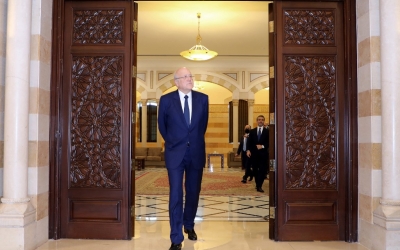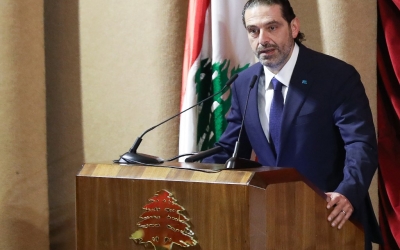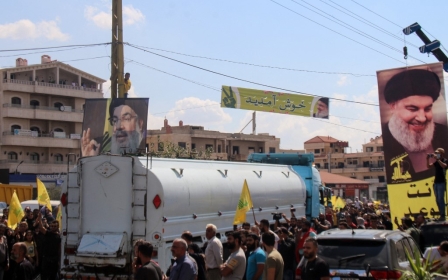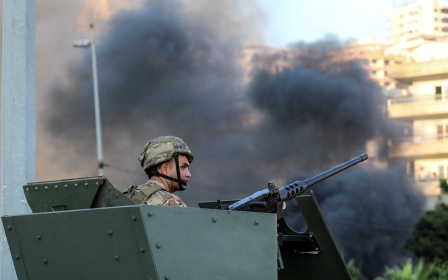Lebanon: New cabinet is the executive team of global capital
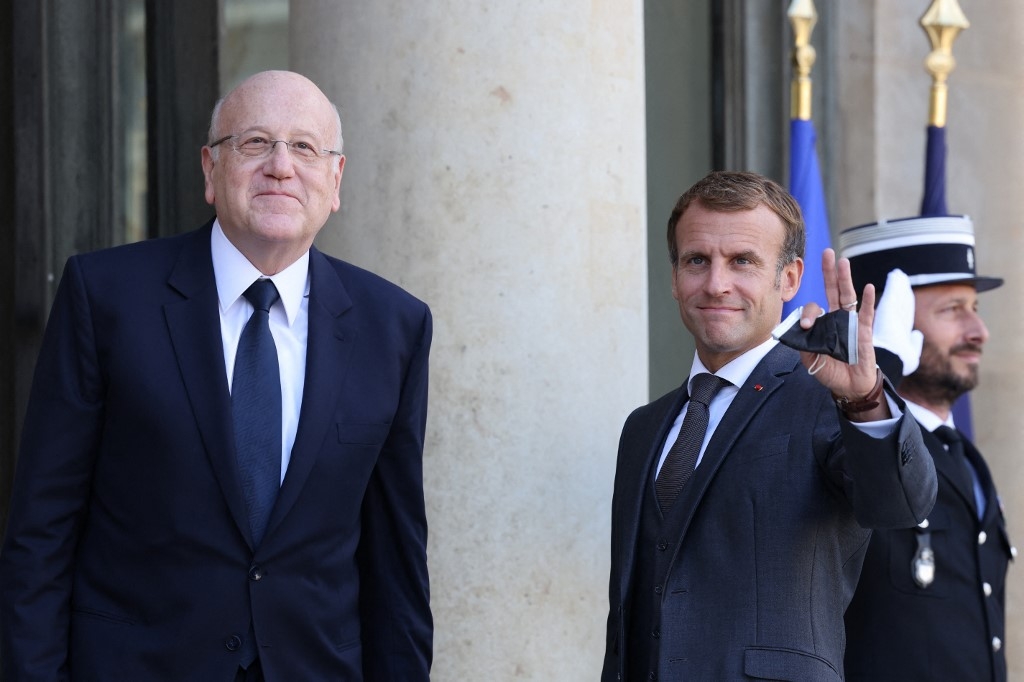
Headed by telecommunications tycoon Najib Mikati, Lebanon’s new government is seeking to modestly stabilise socio-economic conditions in order to politically rehabilitate the regime. In practical terms, this means paving the road for elections in 2022 with sugar-coated austerity. Western economic intervention, largely based on geo-economic calculations, will play a big role in its success or failure.
Foreign economic intervention is often reduced to aid doled out by foreign patrons to local clients or the state. The solution, presumably, is to re-channel this aid to civil society. This approach, already in action since 2019, is short-sighted if not self-serving. It is simply creating new channels of dependency. It is also missing a bigger point.
Mikati's new technocratic team embodies the entrenchment of the oligarchy and its arch-executive, the central bank governor, Riad Salameh
Thanks to the deepening and socio-economic nature of the crisis, and the heightened pace of financial and economic warfare in the region, foreign economic influence and, more specifically geo-economic forces, are becoming embedded in the institutional dynamics of Lebanese politics.
Institutional geo-economic influence ranges from the technocratic composition of the new Council of Ministers, to the plan of implementing austerity, to the East-West tug of energy wars that openly broke out over the importing of Iranian oil shortly before the formation of Mikati’s government.
It is convenient, and in line with the slogan of the 2019 protests of “all means all”, to decry Mikati’s government as more of the same. But this flat and somewhat lazy analysis ignores the ebb and flow of the oligarchy’s grip on power and its willingness to compromise (it is unwilling to capitulate).
New MEE newsletter: Jerusalem Dispatch
Sign up to get the latest insights and analysis on Israel-Palestine, alongside Turkey Unpacked and other MEE newsletters
Mikati’s new technocratic team embodies the full entrenchment of the oligarchy and its arch-executive, the central bank governor, Riad Salameh. Key ministers are also a lot more integrated into global capital, a reminder that whatever blame lies with Lebanese oligarchs, they are one piece of a larger global puzzle.
Global financial tentacles
Unlike his predecessor, Hassan Diab, Mikati is a longstanding pillar of Lebanon’s oligarchy with the most international connections. Through his telecommunications empire, he has global financial tentacles in neighbouring Syria, distant West Africa, and faraway Myanmar. When he announced the formation of his government two weeks ago, he teared up on camera while lamenting the inability of Lebanese mothers to buy basic medicine. On that same day, his international fortune, estimated at $2.9bn by Forbes, increased overnight by $12m.
The new deputy prime minister, Saade Chami, is equally integrated into foreign capital, but on the side of experts, not investors. He spent two decades as an IMF consultant for financial reform (read austerity) before returning to Lebanon in 2013 to serve as secretary-general of the country’s capital markets authority under the supervision of Salameh. In 2018, he left his post to become chief economist at the National Bank of Kuwait group.
Mikati and Chami are supported by a quartet of ministers with geo-economic portfolios. These are the ministers of finance, economy, industry and energy. In principle, the minister of finance is charged with drafting the financial recovery plan in consultation with the central bank and the IMF.
The economy minister is entrusted with mitigating the impact of the crisis on the social economy with World Bank and other foreign assistance. The industry minister, in collaboration with the minister of the economy, is expected to make the transition from a rentier to a productive economy by attracting foreign direct investment. The energy minister is tasked with resolving the intractable challenge of supplying electricity and ending fuel shortages.
A glance at the profile of the new ministers dispels any hope of reform in favour of the people and not the Lebanese oligarchy and its free-market global partners. Minister of Finance Youssef Khalil heads a micro-finance association funded by USAID. He has served at the central bank longer than governor Salameh, first as an economist in the 1980s, and later as head of the financial operations department. His political patron, Speaker of Parliament Nabih Berri, is the patriarch of the post-civil war oligarchy.
Economy Minister Amin Salam is a US corporate lawyer and consultant. As vice-president of the National American-Arab Chamber of Commerce, he mediated the expansion of US capital in the Arab world. The minister of industry, George Bushkian, served on the board of directors of off-shore companies and Lebanon’s association (read cartel) of medical drug importers.
Last, but not least, the energy and water minister, Walid Fayyad, is a graduate of the French higher education system and a former regional manager at Booz Allen Hamilton, a global cash cow, pro-US intelligence gatherer and champion of privatisation and austerity.
Draining of currency reserves
Fayyad kickstarted the government austerity agenda by further deregulating the price of gas, leading to a cumulative 600 percent increase in one year. Typically, this would lead to social unrest. No major protests erupted. Prolonged and severe fuel shortages had led to humiliating queues at gas stations. The previous government was already deregulating the price. This led many to call for, or at least accept, full deregulation as a relief.
The pains of austerity had already been experienced by the entire population. Now, and provided enough fuel is imported, only the poor will suffer. The devaluation of the Lebanese pound is another pre-emptive mechanism that will neutralise any increases in public sector wages promised by Mikati.
To be fair, the fuel “subsidy” was largely benefiting the cartel of fuel importers, who were profiting from the central bank’s willingness to exchange their Lebanese pounds with US dollars at the old rate of 1,500 pounds to the dollar. This was draining the already dwindling hard currency reserves. But removing the “subsidy” without coupling it with anti-inflationary measures or offering alternative public transit will equally harm the middle and lower classes. So far the new government's idea of public transit is to allot a meagre $60m for improving transport and to beg for a donation of buses from France.
Instead of promising to build a proper social safety network of public healthcare and education, the main source of poverty alleviation, in line with IMF wisdom, will be monthly cash injections of two types.
Removing the 'subsidy' without coupling it with anti-inflationary measures will equally harm the middle and lower classes
The first is the longstanding private remittances from Lebanese expats to their families. This has been a major source of social solidarity and a welcome windfall for the oligarchy who send their own money in the opposite direction.
The second source is state-issued cash injections up to $126 a month and officially earmarked for the neediest families. This is likely to turn into a pre-election bribe. The World Bank and the IMF will be contributing to these injections. Lebanon has already secured IMF aid to the tune of $1.1bn as part of the IMF global SDR withdrawal scheme to help nations fight Covid-19. The World Bank is also playing a part in the Lebanese energy wars.
Kicking the can forward
The formation of Mikati’s government coincided with the arrival of the first instalment of Hezbollah-brokered Iranian oil. The move prompted the US ambassador to Lebanon, Dorothy Shea, to reportedly give the green light for striking a deal that would see Lebanon import Egyptian gas and Jordanian electricity via Syria.
On one hand, the importation of Iranian oil helped alleviate immediate shortages, albeit in modest amounts. It also defied US attempts to collectively punish the Lebanese population for Hezbollah’s resistance against Israel and its wider regional interventions against US interests. In short, it put some brakes on Washington’s brinkmanship politics to destabilise Lebanon.
The positive impact of this development, however, should not be exaggerated. The convoluted transportation scheme via Syria, as well as the avoidance of selling it directly to the Lebanese state, shows the limits of defying US sanctions on Iran and Syria. It is also kicking the can forward. Rather than tackling the roots of the shortage crisis, namely the currency collapse and hoarding by oil cartels, it adopts the typical clientelist and aid-based approach.
The US counter-move is not as promising as it sounds. The Arab Gas Pipeline is integrated into stolen Palestinian gas by Israel, which in turn, partly generates Jordan’s electricity. The US may well be hoping to further integrate Lebanon’s energy grid and fossil fuel infrastructure into Israel’s.
It would be a recompense for failing so far to get Lebanon to agree on demarcating its southern border with occupied Palestine in order to facilitate gas excavation. This infrastructure is part of the East Mediterranean Gas Forum which pits Israel, France, Egypt, Greece and Cyprus against Turkey in the race for tapping into the gigantic East Mediterranean gas reserves.
Lebanon lies at the faultline of this geo-economic war. Coupled with its entanglement in the geopolitics of US-Iran tensions, it is harder than ever to imagine its road to change, for better or worse, divorced from the trajectory of these two major conflicts.
The views expressed in this article belong to the author and do not necessarily reflect the editorial policy of Middle East Eye.
Middle East Eye delivers independent and unrivalled coverage and analysis of the Middle East, North Africa and beyond. To learn more about republishing this content and the associated fees, please fill out this form. More about MEE can be found here.



